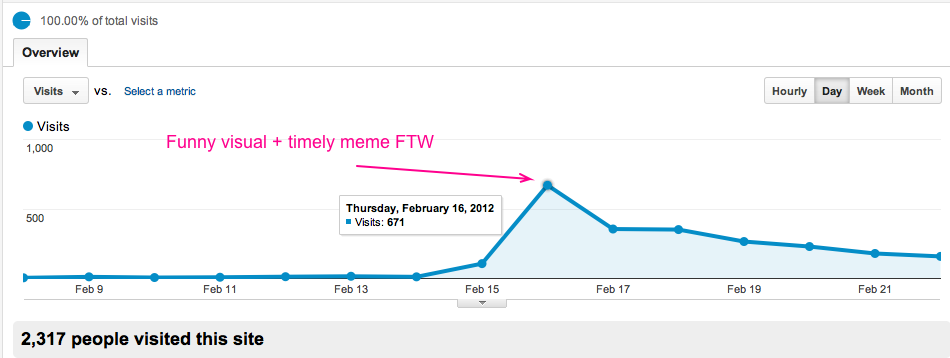Last month’s post on Fresh Insights from Some of Philly’s Top SEO’s generated a lot of great feedback in the form of comments, tweets, and even some very nice emails. The reoccurring theme of the feedback was for more; more Philly SEO, more Q&A, and especially more coverage of the brilliant minds in or from this great city.
This post features some awesome industry feedback and insights from SEO’s who are natives of Philadelphia, some of whom are now kicking ass and taking names in other cities – but just for the record, they all got their start right here. The brainstorming lead to a post on how to structure a killer content marketing campaign.
Just a quick note: this post is long – coming in at just over 4,000 words… so take your time, and perhaps take breaks, so you don’t get burned out on too much SEO (if that’s even possible). In any case, please let me know what you think and if you would like to see more of these. Thanks for visiting and I hope you enjoy.
Responses in this post are from the brilliant mind’s of the following people:
Table of Contents
- 0.1 John Doherty
- 0.2 Ethan Lyon
- 0.3 Devin Concannon
- 0.4 Amanda Orson
- 0.5 Adam Melson
- 0.6 Adam Sherk
- 0.7 Chrissy Buckley
- 0.8 Tom Harari
- 1 John Doherty
- 2 Ethan Lyon
- 3 Devin Concannon
- 4 Amanda Orson
- 5 Adam Melson
- 6 Adam Sherk
- 7 Chrissy Buckley
- 8 Tom Harari
- 9 John Doherty
- 10 Ethan Lyon
- 11 Devin Concannon
- 12 Amanda Orson
- 13 Adam Melson
- 14 Adam Sherk
- 15 Chrissy Buckley
- 16 Tom Harari
- 17 John Doherty
- 18 Ethan Lyon
- 19 Devin Concannon
- 20 Amanda Orson
- 21 Adam Melson
- 22 Adam Sherk
- 23 Chrissy Buckley
- 24 Tom Harari
- 25 Conclusion
 John Doherty
John Doherty
Check out his Blog at www.JohnfDoherty.com, his Tweets @dohertyjf, and his Company Distilled.
 Ethan Lyon
Ethan Lyon
Check out his Blog Posts, his Tweets @ethanlyon, and his Company SEER Interactive.
 Devin Concannon
Devin Concannon
Check out his LinkedIn Profile, his Tweets @devin_concannon, and his Company FreePeople.
 Amanda Orson
Amanda Orson
Check out her Blog at AmandaOrson.com, her Tweets @Phillian, and her Company The Lacuna Group.
 Adam Melson
Adam Melson
Check out his Blog Posts, his Tweets @adammm, and his Company SEER Interactive.
 Adam Sherk
Adam Sherk
Check out his Blog at www.AdamSherk.com, his Tweets @adamsherk, and his Company Define Media Group
 Chrissy Buckley
Chrissy Buckley
Check out her Blog Posts, her Tweets @cbuck1186, and her Company SEER Interactive
 Tom Harari
Tom Harari
Check out his Blog at TomHarari.com, his Tweets @tomharari, and his Company Resolution Media
1. With all of the buzz around SEO now encompassing a wide variety of digital marketing competencies, to the extent that some have suggested a re-branding to inbound marketing, how do you see the industry (and responsibilities of those within it) continuing to evolve over the next 1-2 years?
John Doherty
My *hope* is that we can continue to move out of the silo of rankings and be entrusted to deal with more areas of online marketing, which is really what we do. Along with this, I think we’re going to have to specialize. We can’t all be generalists and good enough at linkbuilding, technical issues, email marketing, PPC, and all the rest to do it all ourselves. We’re going to have to work in teams more.
Ethan Lyon
In the coming years, SEOs will need to take on more of the marketing mix, in particular PR.
It’s incredibly difficult to reach out to someone at Wired or Mashable or other leaders in an industry to ask for something when you haven’t given them anything. Why should they care about your linkable asset? 99% of the times you’re just noise and will be tuned out accordingly. However, if you help writers out with a story they might be working on or give them advice when they might need it, they’re much more likely to reciprocate and help you out when you need to share a linkable asset or need feedback on something to make them link to it.
How do you do this? Set up RSS feeds on Quora & Twitter with their username and a “?” to see when they’re asking questions. Use ifttt.com to push all questions to your mobile, then immediately answer them when they have a question. If you don’t have an answer, research it ASAP or recommend someone you know that might be able to help them.
Then, have an RSS feed with anything of theirs in it (including blog posts, mentions, etc), and be sure to comment on them. If you help someone out when they need, it chances are they’ll reciprocate.
Think about the Hare Krishna that gave away flowers at airports… They found when they gave away flowers, people felt compelled to reciprocate (which meant donations). It’s human nature to reciprocate. Robert Cialdini wrote about it in his book, “Influence.” To tap into that for SEO is so powerful.
PR is just one of the many parts of the new SEO’s responsibilities. It’s funny because I used to write business and marketing plans where I would interview customers, perform industry research, have long conversations with the clients about their business and now I’m finding I’m reverting to that cycle to understand how I can build it into the SEO campaign.
SEO is not just about building links, it’s about understanding the goals of the business owners and figuring out how you can meet those goals through online marketing.
Devin Concannon
To me this is such a tired argument. Rather than banter back and forth about the semantics of job titles and the different disciplines our industry encompasses, I try and focus my time on continuing to learn more of the many facets of this profession, putting in practice as many of the constant improvements coming down the pike as I can, and dreaming up & pursuing search marketing, design, and PR ideas. At the end of the day my goal isn’t to have the most creative title on my team, it’s more organic visibility, more customer engagement, and (hopefully) more revenue.
At the end of the day I feel whether you classify yourself as an inbounder, digital marketer, SEO, etc is so subjective too. No two people bring the same skillsets to the table. If you’re an SEO, just because you’ve read about paid search doesn’t make you an SEM expert. Ultimately it comes down to your knowledge, experience, and most importantly, your successes across strategies of different scale. I run a paid search campaign that’s going pretty well for a friend’s barber shop at the moment. If I was given the keys to my employer Free People’s paid search program, best believe it would look like a hot mess for a little while until I gained some insight into running an account that large in scale.
So that in a nutshell is what I feel we have to grow out of as an industry; lot’s of people talking, not nearly as many adding real value. The propensity to market the individual with the same principles we preach to the businesses we help. To add skills to our titles without actually having conceptualized, project managed, and brought any of these grand ideas to a fruition that bore real value to a customer or a business’s bottom line. I understand people have businesses they’re trying to market, but if your posting some useless bullshit why do you have to put it in on Youmoz where people are looking for real ideas and strategies. I don’t post a lot or go out of the way to market myself not because I’m not interested in recognition, but rather because I spend 50 to 60 hours a week actually putting these concepts into practice. Finit! The people that are putting in the 60 and then writing a post, that’s probably who I want to be reading.
Amanda Orson
Over the indeterminable future the “SEO industry” will become more and more mainstream. This is not a shocking or revealing speculation.
The ramifications of it though, I believe, are that small SEO companies will fold or be consumed by larger increasingly more “full service” digital marketing companies. We may also see a stream of individuals begin to work for Fortune 500 corporations as their internal marketing departments become more Internet focused and less comfortable outsourcing the task, both for intelligence and cost reasons.
Some “Freelance SEO’s” will still exist, but as postmodernism dictates, their functions will become more niche as their primary source of income will stem from a single point of expertise – site audits, link building, paid advertising etc. What will be interesting to watch is whether ‘networks’, or referral interdependency, are created between these solopreneurs and tiny agencies that coexist in different cultural shards of the larger digital marketing/ SEO picture.
From the greater affiliate marketing world I can think of at least a half dozen people off the top of my head who, in the last several years, have evolved into SEO consultants for large corporations, gone into building competitive intelligence tools, and founded one of the microniche link-building agencies discussed above.
The irony is that the very marketing agencies the SEO phenomena disrupted suffered because they clung too long to the idea of a mass market and didn’t evolve fast enough on the digital frontier. I think we’re watching the marketing industry ‘grow up’ and reamalgamate in a new form, with new leadership and new companies at the helm.
Adam Melson
Over the next 1-2 years, there are definitely going to be SEO strategies that will fly under Google’s radar & work, but I expect a change. It is going to be increasingly hard to do well in SEO without a face. Google can see sites that have large blog readership, interact on their G+, have an active twitter account, have an increasing number of feed subscribers & more.
Faceless sites won’t make the investment in pumping out new unique content. Fly by night sites won’t publish great articles & promote them with (gasp) a phone call. PR is increasingly a larger component of an SEO strategy & this combined with the efforts mentioned above are ways the engines can identify more quality sites vs the trash.
Adam Sherk
I got my start in online marketing and eventually SEO through public relations, so I’ve always been a proponent of a diversified, multi-faceted approach. But SEO has always had technical, editorial and marketing components so I don’t things are actually that much different now than they were 5-10 years ago.
The tactics have evolved but the fundamentals are the same, and SEOs need to be well versed in all these areas. A lot of what we do in enterprise SEO consulting is making sure all of those departments have a clear understanding of the SEO implications of their work and how they need to collaborate.
Chrissy Buckley
Here are my thoughts: SEO is like the paella of marketing. It takes just about every type of marketing ability one could possibly have and spits out this awesome dish that can feed the masses. On any given day I beckon on my previous PR and marketing work, whether that be outreach messages or thinking about what might appeal to the masses. I don’t think it’s an insult to be considered inbound marketers for the mere fact that just means we have to prove ourselves and challenge ourselves to answer all sorts of questions.
In the next one to two years, I think you’re going to see a lot of traditional marketing and PR professionals cross over into the field and try to glam up the process. I can also foresee SEO professionals becoming more and more desirable to businesses. I see only good things for the SEO business.
Tom Harari
Understanding marketing concepts is critical to successful SEO. The reality is that with GSPYW, Venice, and Panda, Google has forced webmasters to adapt to a broader definition of “search optimization” or be left behind. I’m hesitant to say that to be successful in SEO you have to be an expert in social, content creation, email marketing, etc. – but you do need to be familiar with those channels to the extent that you understand how they play into the overal marketing mix and how they affect search.
Author snippets increase CTR for a reason. As do video snippets. Sure some may be able to game these signals, but in the long game putting an increased effort into building and distributing quality content and digital assets will only help amplify what we think of as “SEO”.
2. Some people believe that all you need to do is write great content and Google will do the rest. Personally I vehemently disagree with this statement and believe it takes a lot of hard work marketing your content, whether it be through well-placed (or earned) links, press, social outreach, paid promotion, word of mouth, etc. What is your stance on just creating value-add content vs. the need to promote it?
John Doherty
While I am a firm believer in content marketing, I absolutely think that you have to do outreach. Part of this outreach is through already established relationships, and letting people know CAN be as easy as sharing it through social media. Other outreach is going to take a professional PR pitching to a large site where you want a link or feature from. I’ll say it again: great content is NOT enough. Promotion is necessary.
Let’s also not forget that creating great content starts with the audience in mind. When you create content with a specific site or set of people in mind, outreach goes much easier.
Ethan Lyon
Guy Kawasaki is a master at promotion. I can’t remember where I saw this, but he said he didn’t write anything really groundbreaking, but he just knew how to promote other ideas better the people who had them. Might want to watch some interviews with him before quoting that but the point is, you can create all of the amazing content in the world, but if nobody hears about it, then how can they promote it?
In an ideal world, great content goes viral. However, I discover great content every day that no one seems to be talking about.
The first step is to find people that might be interested in your content. Stalk them and promote their stuff / answer and ask questions. Then when you have something that might really interest them, then let them know about it. This ties into my first answer.
Devin Concannon
This to me is a simple answer. What’s the likelihood you’ll be able to create a compelling, engaging piece of content or develop something in a relatively short space of time? I’d wager you have an astronomically smaller chance of creating something that captures people’s attention in 4 hours than you do in 2 months. So the success of your idea is all about the expenditure of time. Whether the work goes into the front end in creating something so useful, thought provoking, or compelling that it attains virality or on the back end efforts of marketing and promotion of your product or content, the work is still getting done somewhere.
Whether your creating something relatively simple that fills a need and market the hell out of it or it’s product\content that’s so awesome it takes a hand in marketing itself, figuring out where your opportunities lie is essential to crafting your marketing strategy. But even with great product or content, we’re not at the point where Google will just “take care of the rest”. Our jobs as SEOs is to make things “the best”.
I’m constantly looking for more opportunities, things to improve, and data that I can make actionable improvements from. My company Free People is a perfect example; we make beautiful bohemian clothing and lot’s of our customers are independent fashion blogger’s who blog and style our product all the time. Often I get great links by just reaching out, telling them we love their posts and just asking them to link back to us. That doesn’t mean I’m not constantly looking for other opportunities to get a link. People are rarely successful by accident or in spite of themselves.
Amanda Orson
Far be it from me to say that a guy who makes millions more than I do is wrong, but I believe Kawasaki’s assertion that if you ‘write great content, Google will do the rest’ is flawed. There would be no need digital marketing agencies, right? Everyone would be a copywriter, video editor or < gasp > infographic producer in this Orwellian society where Google determines what gets to live and die in obscurity.
A content strategy focused on just creating good content- that’s it- is like buying a lottery ticket to get rich. You’re banking on variables beyond your control and prediction.
The ratio of content-value to promotion changes with time and topic, but I think we can all agree that a lot of up front hustle (promotion) for quality content can produce big returns over time if it’s consistent, or viral returns (read: little promotion necessary) when you publish really exceptional content later. Wine Library and Mixergy are both examples that come to mind.
Adam Melson
Writing great content – yeah. I can write the greatest article in the world, but if no one is subscribed to my blog then it will never be shared. Promotion is absolutely necessary for everyone except the 800 lb gorilla. Even large sites who write great content will not gain traction without social promotion.
Yes, people should write great content, but they should have a plan on how to push it out.
Adam Sherk
I primarily work with news and content sites with well established brands, and I can tell you that even major news sites cannot simply publish and forget about it. Publishers have large consumer marketing departments and audience development teams for a reason.
It takes hard work to build brands and audience, in any medium. Search is no different. You need mechanisms in place to get the ball rolling and keep up momentum.
Chrissy Buckley
Have you ever slaved over a white paper for weeks and produced AMAZING content only to find out no one read it? I have and it sucks. The most frustrating thing in public relations was that I would write up these beautiful content pieces and really believed that someone somewhere would read them. That was not the case.
I think SEO is different. You have the ability to write kick ass content and then you also have the ability to place that somewhere other than on the desk of a crotchety journalist who for whatever reason won’t read it. It amazes me that I can find dozens of bloggers who would post guests posts about the most ridiculous subject matter. All and all, to have a successful campaign you need great content and a solid outreach campaign AND you need to promote it.
Tom Harari
Maybe it’s because I began my SEO journey doing link building for SMB’s but I’m firmly in the camp that great content needs effective outreach. Truly great content doesn’t necessarily need GREAT outreach, but letting people know about the content is half the battle.
I’ve seen blog posts with very little outreach catch on like wildfire earning links, shares, and a wave of visits simply because the content resonated with the intended audience.
I certainly don’t blog as much I’d like to, but an image post I did in February caught on with only 1 tweet that went out automatically when I published it. (I didn’t think it would catch on at all).

That being said, take the safe route and publicize your content early and often to the people that matter (linkerati, bloggers, journalists, etc.)
3. What type of content marketing strategy have you found to be the most effective and/or sustainable?
John Doherty
As I’ve said before, having an editorial calendar and diversifying your content types while staying on-brand, identifying influencers in your space and engaging with them where they hang out (whether online or in person) is one way to win. I haven’t personally done this, but I think that there is something to Coke’s 70-20-10 principle, where 70 percent of content is low-risk and the bread and butter that they know works. 20% is innovating off of the content that they know works. 10% is just crazy content that they have no idea if it will work, but if it does, the pay-off can be much greater than the other content.
The key to content marketing is consistency, and success does not come overnight. Look at the well-known bloggers. Look at the brands that we admire for content marketing. They’ve been doing it for YEARS. But ultimately, I think it pays off.
Ethan Lyon
1. Find a similar linkable asset.
2. Find who has linked to it.
3. Stalk them.
4. Create your asset and let them know about it or get their feedback before anyone else.
5. Create an event around it (maybe a contest…)
6. Publish it on PR site, write blog posts about it on your site (informed by some KW research), try to create a video, transcribe the video. The point being, you want to promote the asset in every channel possible (video, blog posts, guest posts, PR sites, slideshare, try to speak about it at a conference, etc).
7. Then anytime someone mentions a similar asset or your asset, make sure they know that you did it and should give you proper attribution.
Check up on it every month and there’s your sustainable linking strategy.
Devin Concannon
Well again this to me is a question of what scalable for your business? At Free People I’m fortunate enough to work often with our very talented bloggers, marketing manager, and a PR manager. So aside from putting out consistently interesting content on a daily basis they also take on big initiatives like giveaways, charity auctions, fashion lookbooks, all things that our customers really respond to. Obviously having this many resources to aid in content creation is the exception rather than the rule. To me the most scalable solution for a small business is transparency.
It works so well for a lot of companies because it’s simply giving customers a look behind the curtain at the things you’re already doing. It’s a humanizing effect that let’s customers or prospects relate to your company as people on this journey with them rather than another faceless organization.
With the advent of smart phones, these days you can basically do all your content on one device. Some video’s, pictures, topical blogging, company news and inside jokes and all of a sudden a potential customer who’s 20 states away has a sense of the people he’s buying from on the web. It’s relatively simple idea to but if embraced by your small business it can be powerful stuff.
Amanda Orson
In terms of both efficacy and sustainability, evergreen content with broad appeal is still tops. I think the single best breakdown I’ve come across on how this is done can be found by perusing Tim Ferriss’ requirements for a Guest Post.
Adam Melson
Sustainable content marketing strategies – there are different levels of a content strategy ranging from just above spammy to absolute quality. Strategies should have multiple ways to use content to get traffic & get links. Whether content is created for guest posts, interviews, written to capture the longtail or to spark controversy & get mentions that way, you can’t put all your eggs in one basket & expect to win over the long run in SEO.
Adam Sherk
It sounds cheesy but the best content marketing strategies are typically those that utilize a “win-win” or “give to gain” approach. A “win-win” effort incorporates some kind of incentive for sharing and/or participation. As for “give to gain” in our industry companies like SEOmoz and Distilled have built strong followings and reputations by sharing a lot of useful information and resources, and building a community around that.
Chrissy Buckley
I’ve found a ton of success in the interview marketing strategy. It’s really interesting to see how many people would LOVE to interview someone who claims to be an expert in a field. I’ve also noticed that no matter the content strategy, you have to personalize the outreach to make the strategy successful. The more I can relate to the blogger I’m targetting the faster the response is.
Tom Harari
The most effective content I’ve seen with clients I’ve worked with usually tends to be either image based or video based content. This isn’t the case with everyone, but there is just so much written content out there that to stand out your writing really needs to be top notch.
Many businesses struggle with hiring quality writers, and while a few startups are making it easier to get into the content game (contently, skyword, and techvalidate), depending on the vertical it may be a better option to focus on visual content instead.
Conclusion
First off – thank you all who contributed, this turned out so much better than I anticipated. As has been heavily discussed, SEO is (or has) transformed to encompass so much more than rankings and traffic. One message I see pretty consistently delivered in this post is the emphasis on continuous development of technical expertise in the areas that surround SEO, to make SEO better, things closer to the traditional definitions of public relations.
The other pattern in this post is the lack of pattern when it comes to each persons experience with sustainable content strategies. From mixing up content topics to include 10% of ‘just crazy,’ writing more core audience-focused evergreen content, focusing on mobile readability, leveraging image and video, ‘giving to get’ or simply outsourcing to established writers – I love the diversity.
More than anything else, I think this reinforces that there are so many ways to create sustainable content that will continue to provide value for your readers and produce results in the search engines, so get out there and test them all to see what works for your target audience.







